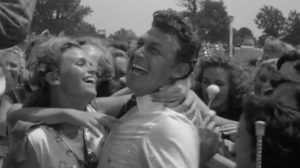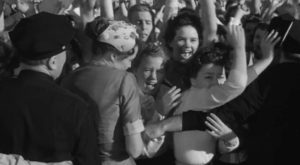Is Something Rotten in Mayberry?: Andy Griffith, Bill Cosby, and Our Instinct to Idolize
I’d heard that Andy Griffith’s performance in A Face in the Crowd (1957) was something to see. But years of believing him the representative of small-town wholesomeness made his first appearance in the film as the target of the law rather than the enforcer of it instantly off-putting. My first instinct was denial. “It must be a mistake,” I thought to myself when he began the movie in jail. “Andy’s innocent.”
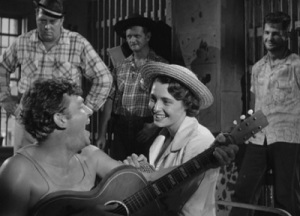
But innocent is one thing this character is not. At the start of the film, Larry ‘Lonesome’ Rhodes (Griffith) seems merely a ham, the kind of man who is a perfect subject for Marcia Jeffries’s (Patricia Neal’s) Arkansas radio program featuring interesting personalities. Most of all, this guy loves to laugh—and what a strong, compelling honk it is.
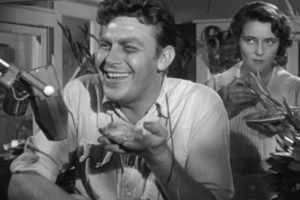
He sings, he jokes, he spins folksy tales about his relatives, like some undiscovered Will Rogers. And he gets people. He has little old ladies giggling over his good ol’ boy hijinks. He describes the pains of housekeeping, and we witness wives stopping to listen to him, hearing perhaps in his telling the first acknowledgement of their woes.
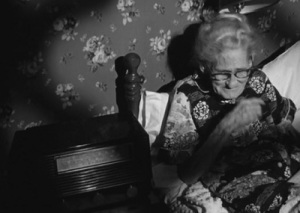
But even from the start, we don’t picture Larry as ‘Lonesome,’ a representative of the little guy his radio listeners imagine. We watch the casual cruelty of Larry’s womanizing ways, his drinking, his avarice and disgust toward the fools he’s impressing. Most of all, we’re disturbed by his treatment of the smart, ambitious woman who discovered him, Marcia (Neal), who is so caught up in his charms and success that she puts up with—well, pretty much everything he does, including dropping her for teen baton twirler Betty Lou (Lee Remick).
Lonesome soon acquires a big—and enormously loyal—following, especially among women, and as he moves from local to national broadcasts, and from radio to TV, he uses that popularity to wield influence.
At first, he does so in funny ways, making jokes on his sponsors and others who annoy him, as when he convinces listeners to send mutts to a mayoral candidate’s house to test out his ability to lead.

But as Lonesome’s numbers grow, and he begins to be courted by politicians eager to tap into his appeal, his ambition and power become menacing rather than funny.
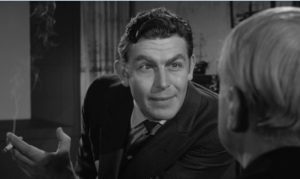
Perhaps because I grew up watching others amused by Rush Limbaugh’s disturbing takes on feminism (feminazis), my trust in Griffith as Larry ‘Lonesome’ Rhodes soon eroded. I kept waiting for his behavior to worsen, but even so, the shock of his betrayals, his arrogance, and his corruption was difficult to experience. While he had other evil roles, Griffith was just so convincing as the loveable sheriff of Mayberry that I didn’t want to picture him in any other way.
I kept thinking of this performance of Griffith’s over the past couple weeks as the reports of Bill Cosby’s alleged crimes kept multiplying. Local radio personalities repeatedly played Cosby’s pudding commercials, creating eerie disjunctions between his fatherly role and the rape accusations. I realized then how wholeheartedly I’d believed Cosby was the character I’d admired in his famous show: a good man, a loving father, a feminist.
I don’t know if the allegations are true. I know it’s important not to jump to conclusions, even when the case against someone looks grim, perhaps especially then. I’ve read too many stories about innocent people destroyed by public opinion even when they were ultimately exonerated, have witnessed the ugly remains of false accusations firsthand. But whether or not these particular allegations are true, this story, and movies like A Face in the Crowd, are reminders to me of how often charm is mistaken for goodness, how closely and carefully we need to examine the figures we choose to revere.

